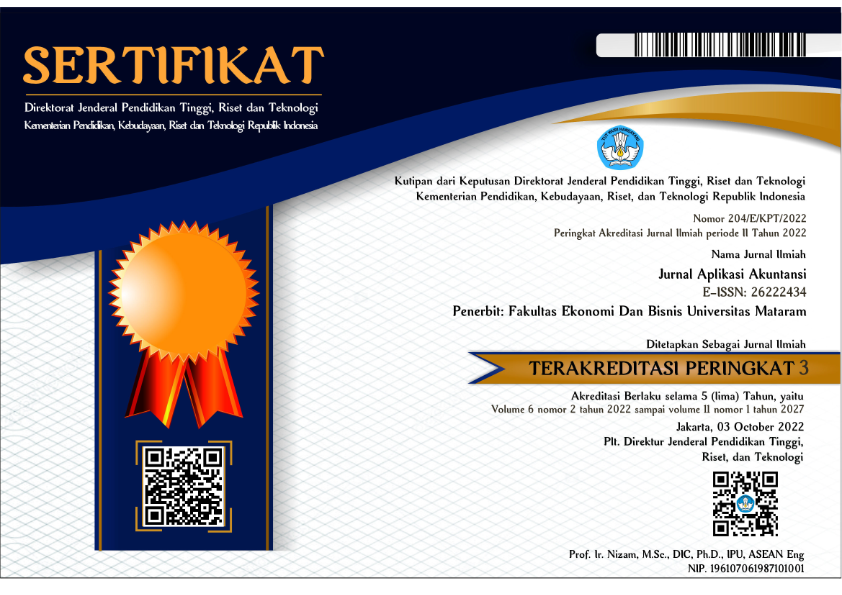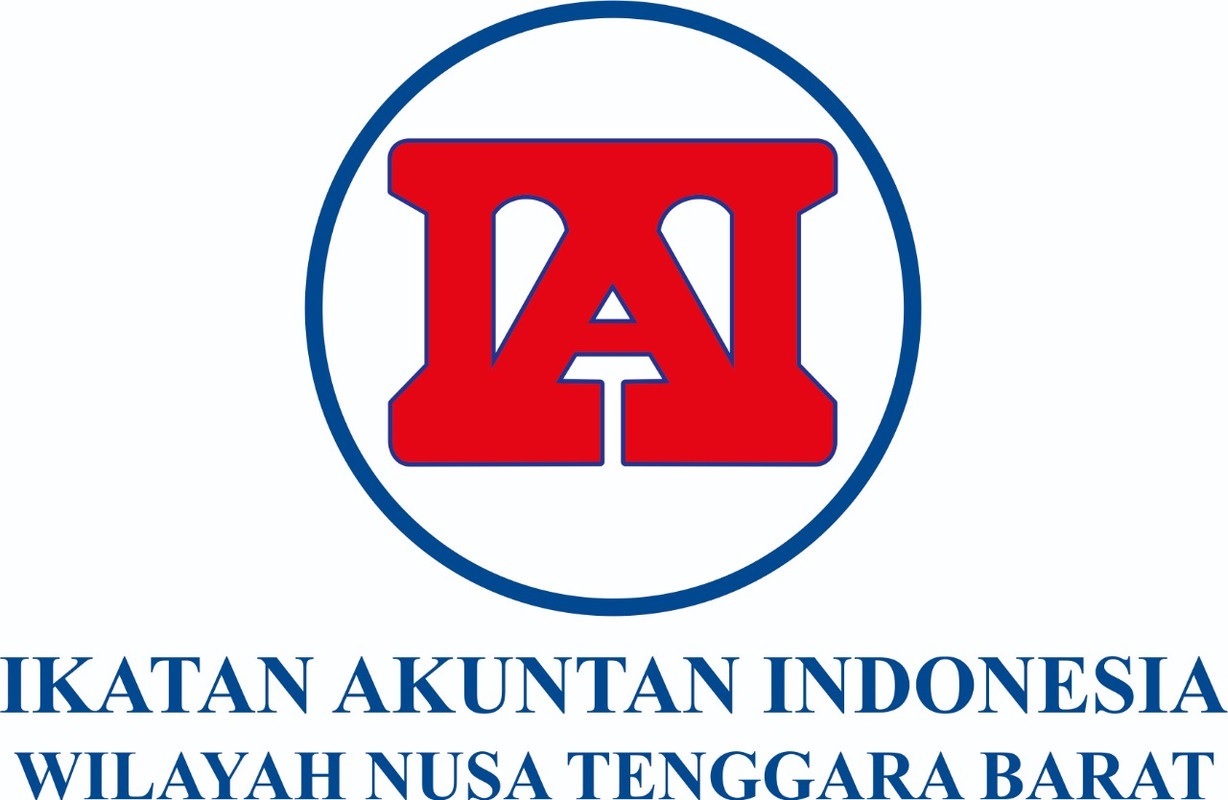AUDIT COMMITTEE MODERATION IN THE NEXUS BETWEEN SUSTAINABILITY REPORTING AND TAX AVOIDANCE: EVIDENCE FROM INDONESIAN MULTINATIONAL FIRMS
DOI:
https://doi.org/10.29303/jaa.v10i1.703Keywords:
sustainability reporting, audit committee, tax avoidanceAbstract
This study investigates the moderating role of the Audit Committee in the relationship between sustainability reporting and tax avoidance among Indonesian multinational corporations listed on the Indonesia Stock Exchange (IDX) during the 2019–2023 period. Panel data were collected from annual reports, Osiris, and Bloomberg databases, with firm selection based on the availability and completeness of financial and ESG disclosures. The final sample comprises 66 multinational firms, yielding 277 firm-year observations, analyzed using panel regression with robust standard errors. The empirical findings reveal that higher levels of sustainability disclosure are significantly associated with greater tax avoidance, suggesting the presence of “sustainability washing,” where reporting serves symbolic rather than substantive purposes. Contrary to expectations, the Audit Committee does not significantly moderate this relationship. Only firm age exhibits a significant negative association with tax avoidance among the control variables, indicating that more mature firms prioritize long-term legitimacy over short-term tax benefits. Beyond its practical implications for regulators and policymakers, such as the Financial Services Authority (OJK) and the Directorate General of Taxes (DJP), who are urged to strengthen oversight and integrate tax accountability within ESG frameworks, this study also contributes theoretically to the ESG tax nexus literature. It extends legitimacy theory by demonstrating that sustainability disclosure, typically framed as legitimacy-enhancing, may paradoxically facilitate opportunistic strategies like tax avoidance in emerging market contexts. This duality underscores the importance of governance effectiveness in ensuring sustainability reporting translates into genuine fiscal transparency.
References
Agustina, N. F., & Wibowo, A. (2023). The effect of sustainability reporting on firm value: Evidence from Indonesia. Journal of Sustainable Finance & Investment, 13(2), 150–165. https://doi.org/10.1080/20430795.2022.2131478
Alrazi, B., & Choudhury, M. A. (2019). Corporate governance and tax avoidance: A meta-analytic review. Corporate Governance: An International Review, 27(3), 161–177. https://doi.org/10.1111/corg.12256
Cormier, D., & Gordon, I. M. (2001). An examination of social and environmental reporting strategies. Accounting, Auditing & Accountability Journal, 14(5), 587–616. https://doi.org/10.1108/EUM0000000006155
Gunawan, D., Meutia, A., & Yusnaini, Y. (2019). Leverage and tax avoidance: Evidence from Indonesia. Asian Journal of Accounting Research, 4(2), 193–203. https://doi.org/10.1108/AJAR-06-2019-0031
Hanlon, M., & Heitzman, S. (2010). A review of tax research. Journal of Accounting and Economics, 50(2–3), 127–178. https://doi.org/10.1016/j.jacceco.2010.09.002
Jensen, M. C., & Meckling, W. H. (1976). Theory of the firm: Managerial behavior, agency costs and ownership structure. Journal of Financial Economics, 3(4), 305–360. https://doi.org/10.1016/0304-405X(76)90026-X
KPMG. (2022). The road ahead: The KPMG survey of sustainability reporting 2022. KPMG International. https://home.kpmg/xx/en/home/insights/2022/11/global-sustainability-reporting-survey.html
Lewellyn, K. B., & Muller-Kahle, M. I. (2021). Corporate social responsibility and tax avoidance: A review and research agenda. Journal of Business Ethics, 173, 1–24. https://doi.org/10.1007/s10551-020-04545-1
Li, W., & Zhang, R. (2017). Sustainability reporting and tax avoidance: Evidence from China. Journal of Cleaner Production, 154, 93–101. https://doi.org/10.1016/j.jclepro.2017.03.194
Management Studies and Entrepreneurship Journal. (2025). The impact of corporate sustainability reporting on tax avoidance: A moderated mediation model. Management Studies and Entrepreneurship Journal, 10(1), 45–63.
Mangena, M., & Chamisa, E. (2016). The effect of audit committee effectiveness on earnings management: Evidence from the UK. Financial Markets, Institutions & Instruments, 25(3), 255–279. https://doi.org/10.1111/fmii.12054
Manurung, R., & Wahyudi, S. (2022). Corporate governance mechanisms and effective tax rates: Evidence from Indonesian listed firms. Jurnal Akuntansi Multiparadigma, 13(2), 270–283. https://doi.org/10.18202/jamal.2022.10.13181
McGuire, S. T., Omer, T. C., & Sharp, N. Y. (2012). The impact of environmental performance on firm risk: Category-level implications. Strategic Management Journal, 33(8), 885–894. https://doi.org/10.1002/smj.1950
Mulyadi, D., & Suhardjanto, D. (2023). The role of audit committees in moderating sustainability reporting and tax avoidance relationship in Indonesia. International Journal of Accounting and Finance, 8(1), 65–79. https://doi.org/10.1504/IJAF.2023.123456
Nguyen, H. T., & Ta, H. N. (2021). Sustainability reporting and tax avoidance: Empirical evidence from emerging markets. Sustainability, 13(15), 8721. https://doi.org/10.3390/su13158721
Organization for Economic Cooperation and Development (OECD). (2021). Tax and sustainable development. OECD Publishing. https://doi.org/10.1787/9789264263636-en
Rudiatun, N., & Anggorowati, R. (2024). The effectiveness of audit committee characteristics in tax compliance: Evidence from Indonesia. Asian Journal of Accounting Research, 9(1), 41–57. https://doi.org/10.1108/AJAR-05-2023-0050
Santika, S., Utama, A., & Dewi, S. (2025). Sustainability reporting and tax avoidance: The moderating role of audit committees in Indonesian multinational corporations. Jurnal Proaksi, 16(1), 112–130.
Simnett, R., Nugent, M., & Huggins, A. L. (2009). Assurance on sustainability reports: An international comparison. The Accounting Review, 84(3), 937–967. https://doi.org/10.2308/accr.2009.84.3.937
Spencer Stuart. (2020). Audit Committee Effectiveness: Global Trends and Insights.
Tanyi, P. N., & Roberts, R. W. (2017). Tax responsibility and cash tax avoidance. Journal of Business Ethics, 146(3), 517–536. https://doi.org/10.1007/s10551-015-2914-4
Torres, L., & Christensen, D. M. (2018). maturing sustainability reporting: A case study on academic and corporate trends. Sustainability Accounting, Management and Policy Journal, 9(3), 304–321. https://doi.org/10.1108/SAMPJ-07-2017-0076
Trireksani, T., & Astuti, D. P. (2020). Corporate governance and tax avoidance: Evidence from Indonesia. International Journal of Law and Management, 62(3), 252–266. https://doi.org/10.1108/IJLMA-06-2018-0153
Ulrich, A., & Möller, K. (2021). Stakeholder engagement and tax risk: The role of sustainability reporting. Accounting & Finance, 61(4), 5303–5336. https://doi.org/10.1111/acfi.12788
Unerman, J., & Zappettini, F. (2014). Contemporary issues in management and sustainability accounting. Management Accounting Research, 25(2), 95–98. https://doi.org/10.1016/j.mar.2014.03.006
Wahyudi, S., & Manurung, R. (2023). Corporate social responsibility reporting and tax compliance in emerging economies. Asia-Pacific Journal of Accounting & Economics, 30(2), 202–217. https://doi.org/10.1080/16081625.2023.2174850
Wijaya, D. T., & Hakim, D. R. (2022). The effect of audit committee characteristics on tax aggressiveness: Evidence from Indonesia. Cogent Business & Management, 9(1), 2076588. https://doi.org/10.1080/23311975.2022.2076588
Zeng, S. X., Tam, C. M., & Tam, V. W. (2015). Corporate social responsibility disclosure and corporate governance in China. International Journal of Law and Management, 57(4), 305–324. https://doi.org/10.1108/IJLMA-01-2014-0007
Downloads
Published
How to Cite
Issue
Section
License
Copyright (c) 2025 Erlina Ismawati, Santi Novita

This work is licensed under a Creative Commons Attribution-ShareAlike 4.0 International License.









